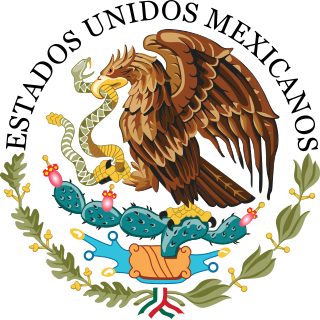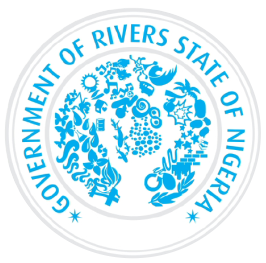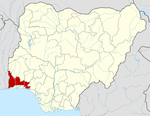
The federal government of Nigeria is composed of three distinct branches: the executive, the legislative, and the judicial, whose powers are vested and bestowed upon by the Constitution of the Federal Republic of Nigeria. One of the primary functions of the constitution is that it provides for separation and balance of powers among the three branches and aims to prevent the repetition of past mistakes made by the government. Other functions of the constitution include a division of power between the federal government and the states, and protection of various individual liberties of the nation's citizens.

The government of Italy is that of a democratic republic, established by the Italian constitution in 1948. It consists of legislative, executive, and judicial subdivisions, as well as of a head of state, known as the president.

The government of Maryland is conducted according to the Maryland Constitution. The United States is a federation; consequently, the government of Maryland, like the other 49 state governments, has exclusive authority over matters that lie entirely within the state's borders, except as limited by the Constitution of the United States.

The Government of South Africa, or South African Government, is the national government of the Republic of South Africa, a parliamentary republic with a three-tier system of government and an independent judiciary, operating in a parliamentary system. Legislative authority is held by the Parliament of South Africa. Executive authority is vested in the President of South Africa who is head of state and head of government, and his Cabinet. The President is elected by the Parliament to serve a fixed term.

The government of the U.S. State of Oklahoma, established by the Oklahoma Constitution, is a republican democracy modeled after the federal government of the United States. The state government has three branches: the executive, legislative, and judicial. Through a system of separation of powers or "checks and balances," each of these branches has some authority to act on its own, some authority to regulate the other two branches, and has some of its own authority, in turn, regulated by the other branches.
The government of Virginia combines the executive, legislative and judicial branches of authority in the Commonwealth of Virginia. The current governor of Virginia is Glenn Youngkin. The State Capitol building in Richmond was designed by Thomas Jefferson, and the cornerstone was laid by Governor Patrick Henry in 1785. Virginia currently functions under the 1971 Constitution of Virginia. It is Virginia's seventh constitution. Under the Constitution, the government is composed of three branches: the legislative, the executive and the judicial.

The government of the U.S. state of Kansas, established by the Kansas Constitution, is a republican democracy modeled after the Federal Government of the United States. The state government has three branches: the executive, the legislative, and the judicial. Through a system of separation of powers, or "checks and balances," each of these branches has some authority to act on its own, and also some authority to regulate the other two branches, so that all three branches can limit and balance the others' authority.

The Government of the Republic of Kenya (GoK) is the national government of the Republic of Kenya located in East Africa. It is composed of 47 Counties, each county with its own semi-autonomous governments, including the national capital of Nairobi, where the national government is primarily based.

The Federal Government of Mexico is the national government of the United Mexican States, the central government established by its constitution to share sovereignty over the republic with the governments of the 31 individual Mexican states, and to represent such governments before international bodies such as the United Nations.

The Government of Rivers State consists of elected representatives and appointed officials responsible for the government of Rivers State, Nigeria. Rivers State has a population of about 5 million people, and is one of the 36 states that make up the Federal Republic of Nigeria. The state government is composed of the executive, legislative, and judicial branches, whose powers are vested by the Constitution in the House of Assembly, the Governor and the High Court. The judiciary operates independently of the executive and the legislature. At the local level, elected officials are in charge of local government areas.

The governor of Lagos State is the head of government of Lagos State in Nigeria. The governor leads the executive branch of the Lagos State Government. This position places its holder in leadership of the state with command authority over the state affairs. The Governor is frequently described to be the number one citizen of the state. Article II of the Constitution of Nigeria vests the executive power of the state in the governor and charges him with the execution of state law, alongside the responsibility of appointing state executive, diplomatic, regulatory, and judicial officers subject to the approval of the Assembly members.
The governor of Rivers State is the chief executive of the Rivers State government and is one of the governors of the thirty-six states of Nigeria. The governor is supported by the deputy governor, both popularly elected for a term of four years. The governor, as head of the executive branch, has the power to appoint commissioners responsible for each of the state's ministries, the heads of parastatals, judicial officers and the state-owned bodies with specific regulatory or administrative duties. They cannot be a member of the state's House of Assembly.
The Politics of Rivers State function within the framework of a presidential republic, with the Governor of Rivers State as both head of state and head of government. Rivers State is known for a politically engaged citizenry. The official seat of government is in Port Harcourt. Under the Constitution, Executive power is vested in the Governor. This does not change the fact that such authority may also be exercised through the Deputy Governor or Commissioners. Legislative power is vested in a 32-member unicameral House of Assembly. Judicial power is exercised solely by the judiciary of Rivers State.
Lagos State Government is the government of Lagos State, concerned with the administration of the state ministries. The government consists of the executive, legislative and Judiciary. The government is headed by the Governor who is the policy-maker and often assisted by the commissioners and other civil servants of the state.
The government of Abia State is the supreme governing authority of Abia State and its local governments. It consists of the executive headed by the governor, the legislative and the judiciary.
The politics of Ogun State function within the framework of a presidential republic, with the Governor of Ogun State as both head of state and head of government. Ogun State is known for a politically engaged citizenry. The official seat of government is in Abeokuta. Under the Constitution, the executive power is vested in the Governor. Such authority may also be exercised through the Deputy Governor or Commissioners. Legislative power is vested in a 26-member unicameral House of Assembly. Judicial power is exercised solely by the judiciary of Ogun State.
The governor of Imo State is an elective political position, one of the governors of the thirty-six states of Nigeria. The governor of Imo State is the chief executive officer of Imo state and its executive branch with the assistance of the deputy governor. Fourteen people have served as governor since Imo State was created in 1976: eight military governors, two military administrators and seven democratic governors. The current governor is Hope Uzodinma of the All Progressives Congress, in office since 15 January 2020.
The Government of Imo State also called The Imo State Government consists of elected representatives and appointed officials responsible for the government of Imo State, Nigeria. Imo State has a population of over 4 to 5 million people, and is one of the 36 states that make up the Federal Republic of Nigeria. The state government is composed of the executive, legislative, and judicial branches, whose powers are vested by the Constitution in the House of Assembly, the Governor and the High Court. The judiciary operates independently of the executive and the legislature. At the local level, elected officials are in charge of local government areas.
Kano State Government is the government of Kano State, concerned with the administration of the state ministries. The government consists of the executive, legislative and Judiciary. The government is headed by the Governor who is the policy-maker and often assisted by the Commissioners and other civil servants of the state.

The government of Edo State serves as the governing authority for Edo State, one of the 36 states within the Federal Republic of Nigeria. It comprises three branches of government: the executive branch led by the Governor of Edo State, the legislative branch represented by the Edo State House of Assembly, and the judicial branch, including the Judiciary of Edo State and the Courts of Edo State. The state government operates under the frameworks of the Constitution of Nigeria and the Constitution of Edo State, delineating the powers, duties, and functions of state organs and institutions. It also encourages direct participation from the electorate through mechanisms such as initiative, referendum, and ratification.











